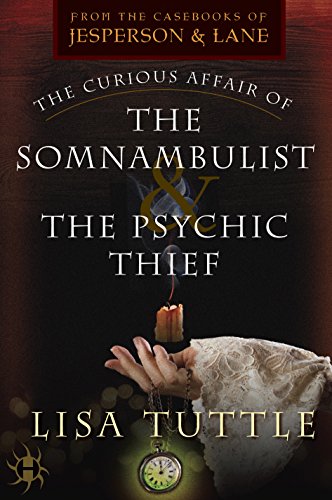 The Curious Affair of the Somnambulist & the Psychic Thief by Lisa Tuttle
The Curious Affair of the Somnambulist & the Psychic Thief by Lisa Tuttle Formats available: ebook, audiobook
Series: From the Casebooks of Jesperson & Lane #1
Pages: 416
Published by Random House Publishing Group - Hydra on May 16th 2017
Purchasing Info: Author's Website, Publisher's Website, Amazon, Barnes & Noble, Kobo, Bookshop.org
Goodreads
To solve some mysteries, one must embrace the impossible.
Has there ever been a more unlikely pair of consulting detectives than Jesperson and Lane? They certainly make a striking duo: Mr. Jasper Jesperson, with his shock of red hair and seemingly encyclopedic knowledge of all subjects—save common sense—and Miss Lane, whose logical mind is matched only by her fascination with psychic phenomena.
Their talents are rare . . . as are their customers. So when Jesperson and Lane are hired to track the nocturnal wanderings of a sleepwalking London business owner, they’re simply happy to be working again. The case begins as a window into the séances and other supernatural parlor games that are so popular these days, and takes a sinister turn as the intrepid investigators pull back the curtain on the cutthroat rivalries underpinning polite society.
But after several mediums go missing, it’s clear that Jesperson and Lane are in over their heads. For they’ve uncovered a presence beyond their understanding—an evil force that won’t hesitate to kill in order to achieve its nefarious ends.
My Review:
I really enjoyed the beginning of this book. It was an interesting set up to a slightly off-beat Sherlock Holmes read-alike, with an even more eccentric Holmes and a female Watson who is not a doctor. On the one hand, their respective eccentricities make Jesperson and Lane closer to partners from the beginning. On that other hand, it also begins as a kind of tweak of the nose at Conan Doyle, because Aphrodite Lane becomes a detective after discovering that her friend and employer Gabrielle Fox, who is supposed to be a skeptical investigator for the Society for Psychical Research, is every bit as much of a fraud and a trickster as every medium they have ever investigated.
Miss Lane is willing to believe, but she wants empirical evidence. Evidence that doesn’t involve secret hooks and pulleys under the table. And I applauded her for that.
But about halfway through, The Curious Affair of the Somnambulist and the Psychic Thief turned into the most infuriating book I have read in a long time, perhaps ever.
I fully realize that sentence requires a bit more explanation.
At the beginning of the story, as Jesperson and Lane get started in their consulting detective business, the setting seems to be the same Victorian London as the Holmes and Watson stories. (There is a tip of the hat to Holmes as a fictional character they are both familiar with). There was, at that time, quite a bit of exploration of and belief in the supernatural, and frauds abounded.
Conan Doyle, in spite of his invention of that most rational detective, Holmes, was himself a great believer in spiritualism (and fairies!). Harry Houdini, formerly one of Conan Doyle’s great friends, practically had a second career as a debunker of mediums and psychic phenomena. Their friendship broke over this fundamental difference of belief.
When the first case is presented to Jesperson and Lane, that of the sleepwalking, Mr. Creavey (in other words, the somnambulist) they are looking for a logical and rational explanation. Which Jesperson eventually finds. Someone is controlling Mr. Creavey through a post-hypnotic suggestion.
And while psychic phenomena are bunk, hypnosis is a well-known and reproducible technique.
And this is where the story goes completely off the rails. At least for this reader. Because the so far rational and redoubtable Miss Lane, who is telling the story in the first-person, becomes completely irrational on the subject of hypnotism and hypnosis, when it is obvious to both Jesperson and to the reader that Miss Lane has herself been hypnotized. The only question yet to be completely resolved is whether her hypnotist is the same as Mr. Creavey’s, but even at the outset it seems all too likely. It would be much too coincidental, in the best detectival tradition, for there to be two different hypnotists involved in the same case.
Whether hypnosis works exactly as portrayed in the story is questionable, but it certainly does work and does exist to a significant extent. That the amount of control the hypnotist has over his victims seems rather greater than is considered the norm feels like it falls within the spectrum of fiction.
But it gets worse. While the formerly rational Miss Lane descends into risible irrationality, what drove this reader off the edge into fury was that the story seemed to change its basic premise. While throughout the book it seems to be part of the historical Victorian era, when mostly gullible or desperate people believed in spiritualism but it was not proven, the ending of the story requires that this setting become a world in which psychic phenomena are real and functional.
In other words, we began in rationality and ended with magic, with no explanation for how the basic way that the world works seems to have flipped on its head.
Escape Rating C-: I did finish, which gets the C grade. And I’m still thinking about the book, and still furious, which also keeps it in the C category. But, but and very definitely but. I am so disappointed. What read like a very promising start descended so far on so many levels. Miss Lane’s descent in particular, from rational action to idiocy was particularly galling, especially as we view the story from inside her head.
I enjoy stories where magic works. I love urban fantasy. But if that’s the case, it needs to be established, or at least hinted at, from the beginning. That’s not what happened here. And yes, I’m aware that some of the promotional materials delve a bit into the supernatural aspects, but a) promotional materials don’t always represent the work in hand, b) the switch between absolute belief in rationality to confirmed belief in “magic” is not even subtext in the actual text, and 3) the point-of-view character still changes from an interesting and rational being to a complete idiot.
Color me extremely disappointed. And very, very annoyed.

















